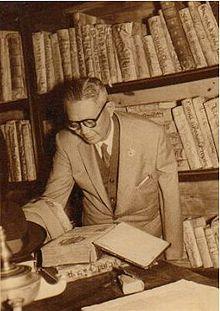Antonio Abad | |
|---|---|
 | |
| Born | Antonio Abad y Mercado May 10, 1894 Barili, Cebu, Captaincy General of the Philippines |
| Died | April 20, 1970 (aged 75) |
| Language | Cebuano, Spanish |
| Nationality | Filipino |
| Alma mater | Colegio-Seminario de San Carlos |
| Notable awards | Premio Zóbel, Premio Literario Filipino de la Mancomunidad |
| Spouse | Jesusa Henson |
| Children | Gémino H. Abad, Antonio H. Abad Jr., Edmundo H. Abad |
Antonio Abad y Mercado was a prominent Filipino poet, fictionist, playwright and essayist.
Personal life
Antonio Abad y Mercado was born in Barili, Cebu, under the Captaincy General of the Philippines, on 10 May 1894. He was educated at the Colegio-Seminario de San Carlos in Cebu City. He married Kampampangan teacher Jesusa Henson y Aquino., and had three sons: Gémino, Antonio Jr., and Edmundo.
Career
Abad frequently wrote in both, his native language, Cebuano, and Spanish. He was a strong advocate of the Spanish language and Hispano-Filipino culture when its use was discouraged during the American colonial period in the Philippines. Abad was one of the leading contributors of Hispano-Filipino literature during his time, producing novels and plays criticizing the occupation of the islands by the Americans. His works would later be known as part of the Golden Age of Fil-Hispanic Literature (1898-1941). Two of his novels went on to win the Premio Zóbel, the oldest literary award in the Philippines, in 1928 and 1929.
Abad taught Spanish at the Far Eastern University. In 1952, he moved to the University of the Philippines Diliman to found the Department of Spanish (now, the Department of European Languages) at the then, College of Liberal Arts. He headed the department until his retirement in 1959. One of his last works, a multilingual dictionary of Spanish, English, Cebuano, Ilocano and Kapampangan, remained unfinished after his death in 20 April 1970.
Novels
- El Último Romántico (1928)
- La Oveja de Nathán (1929)
- El Campeón (1940)
- La Vida Secreta de Daniel Espeña (1960)
Plays
- Dagohoy, 1940 Philippine Commonwealth Literary Award.
Essays
- De la hora Transeúnete, 1940, Philippine Commonwealth Literary Award.